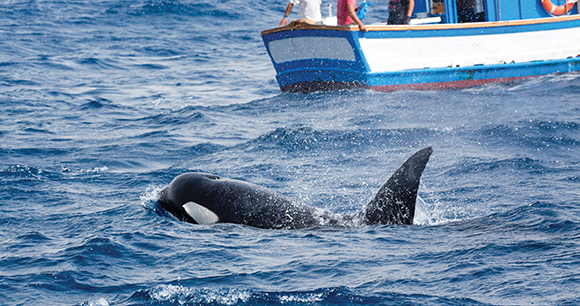A critically endangered population of orcas, numbering only 40 individuals, inhabits the outer coastal waters of the Iberian Peninsula. Since spring 2020, these whales have been dramatically interacting with boats—mostly sailing yachts. These interactions started with a small number of juveniles and some minor damage to the vessels, but over time have expanded within the population and increased in intensity. No mariners have been injured, but at least 15 identified orcas are now involved and almost 500 interactions have left several vessels unable to navigate due to rudder damage. At least five have sunk.

These interactions have made international news. The predominant media narrative is that the orcas are attacking these boats in response to some initial incident—such as a vessel collision—that injured an orca, who then recruited podmates to retaliate.
After several seasons of monitoring the situation, scientists have concluded that, in fact, this behavior has more in common with play, where the orcas are focused on rudders as intriguing objects in their environment. Despite the distressing (and expensive) outcome for mariners and boat owners, the interactions do not seem aggressive. AWI’s Dr. Naomi Rose led an open letter from almost 80 cetacean experts, including several orca biologists focused on this population, stressing this conclusion and urging the public—as well as mariners and authorities who must manage this situation—to avoid attributing human motivations to the animals. Such narratives may lead mariners to fear orcas, even when they do nothing. Fear can lead to dangerous and harmful attempts to deter cetaceans when they approach vessels, even outside the Iberian region.
Orcas are known for developing novel behaviors with no obvious function. These behaviors are considered cultural fads—appearing and disappearing in populations without explanation. AWI is working with regional experts and authorities to counter disinformation and ensure these orcas are not punished for simply doing what they do naturally in their own home.